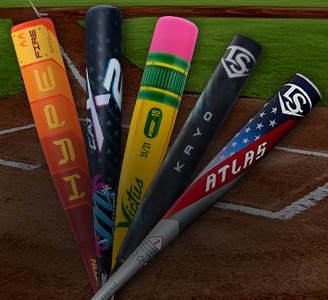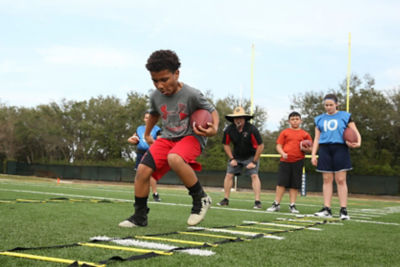How to Choose a Football Facemask
When the action begins, having the right facemask that aligns with your position and protection needs is essential to perform your best.

The one thing between your face and your opponent is a thin piece of metal. This vital piece of protective gear is designed to help protect your face from the action you encounter on the football field.
Maybe, at first glance, you’d consider choosing the facemask with the most bars, but the choice is a bit more complex than that.
So, what is it you should look for when buying a facemask? Let’s get to it.
MATERIAL
Facemasks are made of three standard materials: Carbon steel, stainless steel and titanium.
The most common option, and most affordable, is carbon steel. Tough and durable, carbon steel is heavier than other material choices.
Although more expensive, stainless steel facemasks offer durable protection with a lighter overall weight.
The top material, worn mainly by the pros, college athletes, and some elite high school teams is titanium. Titanium facemasks combine lightweight construction for speed with superb strength and durability.
No matter which material you choose, the model you need varies based on your position and responsibilities on the field.
CLOSED CAGE
The closed caged, (also called a full cage) is a type of facemask does exactly what you’d expect: it maximizes the protection of your face without compromising your field of vision.
Closed cage models typically include numerous horizontal bars along the bottom half of the facemask. This type of facemask is a good option for players in the trenches who desire maximum protection for their eyes, face, mouth and chin from the fingers, arms and elbows of their opponents. Linemen, linebackers and fullbacks traditionally use this type of facemask due to the continued physical nature of their position.
More bars equals more protection and durability, but also lowers visibility and field of vision.
OPEN CAGE
For some positions, added visibility is key to success. An open cage facemask has horizontal bars at nose level and below, but is open around the eye area to maximize the player’s field of vision.
These facemasks are designed for skill players like quarterbacks and wide receivers, who need to be able to see the whole field and the ball at all times. They are also good for kickers and punters, who need enough visibility to aim.
Some models are designed to provide extra protection for skill players who demand open vision and protection. Many open cage models include eye protection in the form of an extra vertical bar in the players’ peripheral view or the jawline to help reinforce oral and eye protection.
Open cage facemasks offer a good balance of vision and protection for players who possess the ball often and are looking for a better level of protection from oncoming hits. But if you need even more protection without sacrificing visibility, there is another option that you can clip to your facemask: a football visor.
FOOTBALL VISORS
Although most leagues do not require football visors, they are increasingly popular with both youth and pro players because of the additional eye protection they can provide. They can also be helpful to filter out glare and could even make it more difficult for opponents to read your eyes during the play.
A lightweight material like polycarbonate, with an anti-fog layer, helps your vision remain unimpeded. So, if you’re looking to unlock advanced benefits, find a visor that has a tint like sunglasses, since that can help shroud your eyes and cut down severely on disruptive sunlight. Always check with your league regarding guidelines or limitations on what players are permitted to wear before picking up a tinted visor.
Generally speaking, most brands create facemasks specifically designed to fit on their specific helmets and come in youth or adult sizes.
Whether you’re going head to head with your team’s biggest competitor or scrimmaging during football camp, having the right facemask can make a big difference in protecting you on the gridiron.
Before the season starts, make sure you know what to look for when buying other vital football protective gear — like a football helmet and chin strap — so that you’re ready to take the field.











